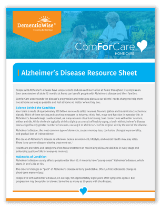Looking for In-Home Care? See All Services
The most common type of dementia, Alzheimer’s disease affects over 700,000 Canadians, and each day, more and more families are affected by a diagnosis. This progressive brain condition is marked by cognitive decline, memory loss, and challenges in daily activities. Caring for someone with Alzheimer's can feel overwhelming for families. However, ComForCare offers proven, evidence-based tips to assist caregivers and enhance the lives of those with dementia.
Explore ComForCare's resources on Alzheimer's, which cover early warning signs, what to expect with the disease’s progression, and more. Learn more about this type of dementia in our guide or get in touch with us for further details.

Alzheimer's disease is a progressive and neurodegenerative disorder that primarily affects the brain's cognitive functions. It is the most common cause of dementia, responsible for approximately 60-80% of all dementia cases. The disease typically starts with subtle memory loss and difficulty in recalling recent events, which may be mistaken for normal aging initially. However, as Alzheimer's progresses, it impairs other cognitive abilities, including language, problem-solving, decision-making, and spatial awareness.
The hallmark features of Alzheimer's disease are the presence of abnormal protein deposits in the brain. Amyloid plaques and tau tangles accumulate between nerve cells, leading to the dysfunction and perishing of brain cells. These changes primarily affect the hippocampus, a brain region essential for memory formation, learning, and emotional regulation. As the disease advances, the damage spreads to other areas of the brain, resulting in widespread loss of brain cells and significant brain shrinkage.
The progression of Alzheimer's disease can be broadly categorized into three stages: early/mild, middle/moderate, and late/severe stages. In the early stage, individuals may experience mild memory loss and subtle cognitive difficulties. As the disease advances, memory problems become more apparent, and individuals may struggle with language, orientation, and daily tasks. In the late stage, severe cognitive decline leads to a loss of ability to communicate, recognize loved ones, and perform basic self-care activities.
After age 65, the likelihood of developing Alzheimer's disease significantly rises, although younger individuals may also be affected. Typically, short-term memory loss marks the initial noticeable change. During the early stages, individuals might:

Although individuals with Alzheimer's disease face difficulties in daily activities and self-care, independence can be maintained with a well-crafted care plan. ComForCare delivers specialized Alzheimer's care in the familiar setting of your loved one's home, employing evidence-based practices from our DementiaWise® training program to enhance their well-being. Additionally, we connect family members with valuable resources, including support groups and effective home care strategies. Explore how we approach in-home care for Alzheimer's at every stage.



Each office is independently owned and operated
and is an equal opportunity employer.
© 2026 ComForCare Franchise Systems, LLC.
Contact Us
(800) 886-4044